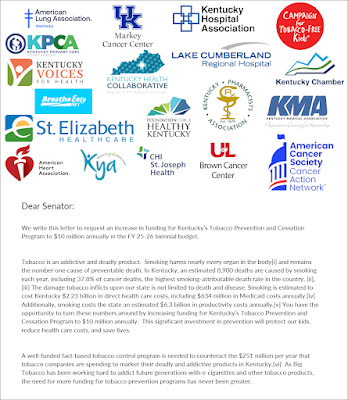Top senators, one of whom lost both parents to smoking, say no advocates spoke to them about increasing anti-tobacco spending

By Al Cross
Kentucky Health News
Kentucky’s top two state senators said Tuesday that none of the advocates for more funding of tobacco prevention spoke to them about it during the legislative session that ended Monday night.
“I never heard from those advocates. They never came to meet with me, and they probably should’ve. . . . I was in the room where it happened, and nobody ever spoke to me,” Majority Floor Leader Damon Thayer of Georgetown said in response to a question from Kentucky Health News.
Thayer spoke at a Capitol rotunda press conference where leading Senate Republicans discussed what they considered to be the session’s accomplishments. Senate President Robert Stivers told Kentucky Health News afterward that no one ever spoke to him about the proposal to increase tobacco-prevention spending to $10 million a year from $2 million.
 |
| Letter to senators (For a larger version, click on it.) |
The proposal came from the American Cancer Society and several other groups interested in better health, including the Kentucky Chamber of Commerce. In a letter to senators, they said smoking is the No. 1 cause of preventable death in Kentucky and causes $2.23 billion in health-care costs, including $634 million in the federal-state Medicaid progam that covers more than one in three Kentuckians.
“A well-funded, fact-based tobacco control program is needed to counteract the $251 million per year that tobacco companies are spending to market their deadly and addictive products in Kentucky,” the letter concluded. “As Big Tobacco has been working hard to addict future generations with e-cigarettes and other tobacco products, the need for more funding for tobacco-prevention programs has never been greater.”
Thayer said after the press conference, “I get stacks and stacks of budget requests, and if they say, “I sent him a letter or an email,’ that’s not effective.”
Kentucky Health News asked Doug Hogan, the Kentucky lobbyist for the cancer society, what legislators the advocates spoke with and why Stivers and Thayer were not included. He replied with this email:
“The American Cancer Society Cancer Action Network (ACS CAN) is proud to have advocated for the health of Kentuckians during this General Assembly session by asking for an increase in funding for the state’s tobacco prevention and cessation program. ACS CAN staff and volunteers were able to contact Senate and House offices to share the importance of this funding. ACS CAN is disappointed that our message was not heard, and a significant investment was not made in programs to help prevent kids from starting to use tobacco products, including e-cigarettes, and help those already addicted to quit.”
At the press conference, Stivers was asked if tobacco-control spending would be a good investment in the long term, by reducing health-care costs. He gave Thayer the microphone.
Asked if he thinks the current $2 million tobacco-control budget doesn’t work, Thayer said, “I honestly don’t know that it does. Honestly. I mean, how much money can you spend trying to dissuade people from doing something that everybody knows is unhealthy?”
Earlier, he said, “Everybody knows that smoking cigarettes is bad for you. . . . My dad knew the health risk his whole life and he never quit.” Earlier, he said, “Both my parents died of cancer from the fact that my father was a multi-pack-a-day smoker, so this is an issue that’s a little sensitive to me.”
Thayer told Kentucky Health News after the press conference he believes that smoking killed his father, who died of esophageal cancer, and that secondhand smoke in their home killed his mother, who died first, of multiple myeloma: “I never saw her smoke a cigarette in my life.” He acknowledged that more education on the risks of seocndhand smoke is needed.
When the final budget was released, Kentucky Health News asked Senate budget committee Chair Chris McDaniel of Northern Kentucky why there was no increase in tobacco-control spending. He said, “We kind of distributed it more broadly, with increases in funding for cancer research.”
Stivers said likewise at the press conference, adding that health departments also got more funding. “What we are trying to do in all areas is to encourage people to have better and healthier lifestyles,” he said.
Kentucky Health News is an independent news service of the Institute for Rural Journalism and Community Issues, based in the School of Journalism and Media at the University of Kentucky, with support from the Foundation for a Healthy Kentucky.
Donate to Kentucky Health News here.
http://kyhealthnews.blogspot.com/2024/04/top-senators-one-of-whom-lost-both.html